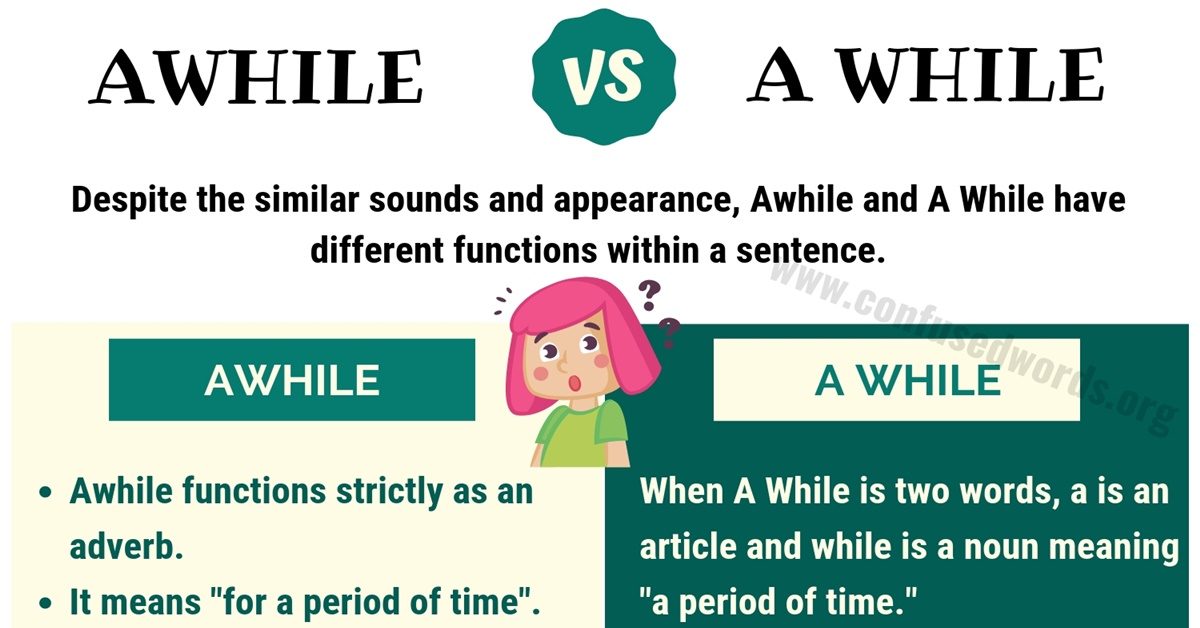In the English language, the distinction between "awhile" and "a while" often confuses even the most seasoned writers. While both terms relate to a duration of time, their usage is not interchangeable. Understanding the nuances of these two phrases is crucial for anyone looking to communicate effectively and clearly. In this article, we will delve into the differences between "awhile" and "a while," providing examples and practical tips to help you choose the right term.
When we examine the terms "awhile" and "a while," we notice that they serve different grammatical functions. Awhile is an adverb that means "for a short time," while a while is a noun phrase referring to a specific length of time. This subtle distinction can lead to misunderstandings if not used correctly. In conversations or written communication, using the wrong term could make your message less clear, leading to confusion among your audience.
As we explore the topic of "awhile vs a while," we will address common questions, provide practical examples, and highlight the importance of using these terms correctly. By the end of this article, you will have a better understanding of how to use "awhile" and "a while" in your writing, ensuring that your communication is both precise and effective.
What is Awhile?
Awhile is an adverb that means "for a short time." It is often used in sentences to indicate a brief duration. For example, you might say, "Please wait awhile." Here, "awhile" indicates a short waiting period. It is important to note that "awhile" is never used with a preposition. For instance, you would not say "for awhile." Instead, you would use "for a while."
What is A While?
A while is a noun phrase that refers to a specific period of time. It is typically used with prepositions, such as "for" or "in." For example, you could say, "I haven't seen you in a while." In this case, "a while" indicates a certain length of time since you last saw the person. This phrase can often be substituted with other time-related expressions, such as "a long time" or "a short time," depending on the context.
How to Use Awhile and A While in Sentences?
Understanding how to use "awhile" and "a while" correctly in sentences is essential for clear communication. Here are some examples to illustrate their proper usage:
- Awhile: "She rested awhile after the long hike."
- A While: "It took a while to finish the project."
As you can see, "awhile" modifies the verb "rested" to indicate a short duration, while "a while" functions as the object of the preposition "for" in the second example.
When Should You Use Awhile vs A While?
Knowing when to use "awhile" versus "a while" can be challenging, but there are a few guidelines to help you make the right choice. First, consider whether the word you want to use is modifying a verb (awhile) or functioning as a noun (a while). If you are talking about a duration of time without a preposition, use "awhile." If you are referring to a specific period of time, usually with a preposition, then "a while" is the correct choice.
Can You Use Awhile and A While Interchangeably?
No, "awhile" and "a while" cannot be used interchangeably. Their grammatical roles differ, and mixing them up can lead to confusion. For example, saying "Please sit for awhile" is incorrect; the proper phrase would be "Please sit for a while." Understanding this difference is crucial for anyone who wants to write or speak English correctly.
What Are Some Common Mistakes with Awhile and A While?
Many individuals mistakenly use "awhile" in places where "a while" is appropriate. Here are some common mistakes to avoid:
- Incorrect: "I will be gone for awhile." (Correct: "I will be gone for a while.")
- Incorrect: "Stay awhile!" (Correct: "Stay for a while!")
Paying attention to these common errors can help improve your writing and speaking skills.
Why Does Understanding Awhile vs A While Matter?
Understanding the difference between "awhile" and "a while" is essential for clear communication. Whether you are writing an essay, sending an email, or simply having a conversation, using these terms correctly will enhance your credibility as a communicator. Precision in language reflects thoughtfulness and attention to detail, which are highly valued in both personal and professional settings.
Can Mastering Awhile vs A While Improve Your Writing Skills?
Yes! Mastering the difference between "awhile" and "a while" can significantly improve your writing skills. By ensuring that you use these terms correctly, you demonstrate a command of language and enhance the clarity of your message. This attention to detail can make your writing more persuasive and engaging, whether you are drafting an academic paper, a business proposal, or creative writing.
Conclusion: Awhile vs A While
In conclusion, the difference between "awhile" and "a while" is an important aspect of English grammar that can greatly influence your communication skills. By understanding the definitions, uses, and common mistakes associated with these terms, you can confidently incorporate them into your writing and conversations. Avoid the confusion surrounding "awhile vs a while" by remembering their distinct grammatical roles and applying them appropriately in your sentences. With practice, you will master these terms and enhance your overall language skills.



